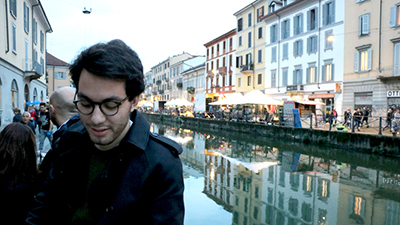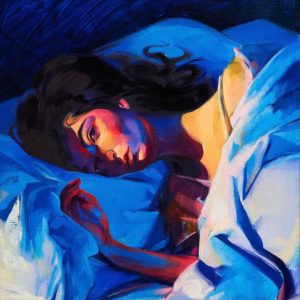
BY MERT ENEY (LAW/IV)
mert.eney@ug.bilkent.edu.tr
This is the last of three installments looking back at some of the musical highlights of the year.
This week I return with my top 5 favorite albums of 2017, a continuation of last week, which counted down from 10 to 6. These are the albums that highlighted my year – they accompanied me on train journeys up and down England, played during walks and subway rides, became monumental as I reconnected with old friends, and helped me get through some rough times. The artists who created them, apart from showing enormous talent for capturing the human condition, also represent something bigger – they are all commonly “marginalized.” 2017 was a year of change, when we, as listeners, finally took up the challenge to demand traditionally unheard voices – of black/queer/female artists – and asked for their insights on how to live.
5. Moses Sumney: “Aromanticism”
The recently discovered writer Chris Kraus once wrote, “Every letter is a love letter”; but the world has seldom seen letters that are daringly not about love, or aromantic in nature. Moses Sumney’s debut, “Aromanticism,” offers such an insight into the convictions of his idle heart, defiantly untied to anyone but himself. Mainstream music feeds off the commodification of love, the exploitation of our most sacred feelings, and Sumney’s album is a piercing portrait showing the need for a different kind of musical narrative, one that is not about commercialized convictions of love. It exists at the intersection of the deeply intimate and the wildly private – a fierce debut from a promising newcomer.
4. SZA: “ctrl”
The personal is political, but it is also deeply universal. SZA’s long awaited debut, “ctrl,” came out this year and is inarguably the best R&B release of 2017, triumphantly unapologetic in its magnitude. The album is a chronicle of confessions, both public and private – it not only allows a peek into SZA’s relationships, but also speaks truth about the nature of any interaction. SZA reclaims societally ostracized labels (promiscuity, dependency) from the domain of shame, and in songs like “The Weekend,” this is more than evident – she puts a certain agency, a kind of pride into being the “side chick.” In interviews, she talked about how control, the album’s title, is an illusion, but I can’t remember any other artist in recent memory being more in control of their creative vision and musical output than SZA.
3. Kendrick Lamar: “DAMN.”
Kendrick Lamar is the definitive rapper of our age, and in “DAMN.,” his fourth album, he once again declares this matter of fact. The album sees Kendrick reflecting on the American landscape, which has been thrown into complete chaos since his last album, 2015’s “To Pimp a Butterfly” (my favorite album of that year). A concept album, “DAMN.” is rendered with the kind of poise we’ve come to expect from the rap mastermind – extremely verbose, and at once illuminative and allusive. The album’s thematic vertebrae connect with everything from religious convictions to the black experience in the 21st century – and provide deep insights about our world. The beat arrangements and the electronic production are so far ahead of their time that “DAMN.” proves again and again that Kendrick Lamar is the greatest, most forceful act currently shaping the world of music.
2. Perfume Genius: “No Shape”
The latest by Perfume Genius (the moniker of Mike Handreas) is an incredible self-portrait of a relationship that is both private and political. The album is perhaps Handreas’s ghost roaming the house at night, moving very slowly, so as not to disturb his lover. “No Shape” is about the new-found comfort of happiness; like the commoners, Handreas accepts domesticity. He partially gives in to the seduction of normalcy, but doesn’t go without a bang – he is still radical, as he declares in “Braid”: “I won’t give / Settle in.” This is a grandiose body of work, expressive and yet deeply reserved about emotions – an elegy to all the lives not lived. In this album, Handreas lets out everything he has involuntarily memorized and offers an alternative narrative about love, one that happens to be queer. “The moment of queer pride is a refusal to be shamed by witnessing the other as being ashamed of you” writes Maggie Nelson in her acclaimed book “The Argonauts,” and Handreas is doing just that in “No Shape” – he refuses to be shamed for all of us.
1. Lorde: “Melodrama”

Melodrama: (noun) “a sensational dramatic piece with exaggerated characters and exciting events intended to appeal to the emotions.”
After her breakout as a teenage sensation in 2013 (with the lead single “Royals”), Lorde has returned this year with “Melodrama,” which is my selection for the best album of 2017, anywhere, according to any system of criticism. Four years of absence from the public eye have seen Lorde doing everything in her power to create the kind of full-blown masterpiece that comes maybe only once in a decade. The album is first and foremost about love, how we use and abuse one other, but it is also about the messiness of turning into an adult – it is unmistakably about, to quote the late David Foster Wallace, ending up becoming yourself. The album feels like late-adolescent witchcraft, casting spells (late-night texts to a lover) and conducting bloodlust rituals (house parties) to bear testament to a life lived – hedonistic, platonic and over-the-top romantic. A concept album that is loosely based on a single night spent at a house party, “Melodrama” sees Lorde rightfully earning the title of the definitive poet laureate of our loveless generation.
The joke is that when “Pure Heroin” (her debut album) came out, Lorde was mistakenly labeled as an “old soul” who was projecting something far beyond her years. In “Melodrama,” she is anything but old, a writer in the dark documenting the many lives of her generation – she is, most definitely, the patron saint of the millennial experience. Who else writes with such verbal affluence? Who else understands and reflects emotions with such a clear grip of the universal? “Melodrama” is pure poetic force, gleaming with the emotional renaissance that is coming of age. Every line is purposefully built upon the other, perhaps to construct a monument to faded love (by virtue of the breakup album). Her lyrics are beyond operatic in proportion, and she does it again and again, in every song, with every line. “They’ll talk about us / All the lovers / How we kissed and killed each other,” and again, “I love you till you call the cops on me,” and yet again, “I’m acting like I don’t see / Every ribbon you used to tie yourself to me.” Lorde is an obsessive observant to a point where it’s clear lunacy – how in the world can an album feel as if it’s written directly to you, as if to become the soundtrack to your life? It baffles me; I’ve spent the whole year trying to understand, but perhaps that’s the beauty of music at its very core – like all great art, it has the power to alter your life in ways you never imagined was possible.
